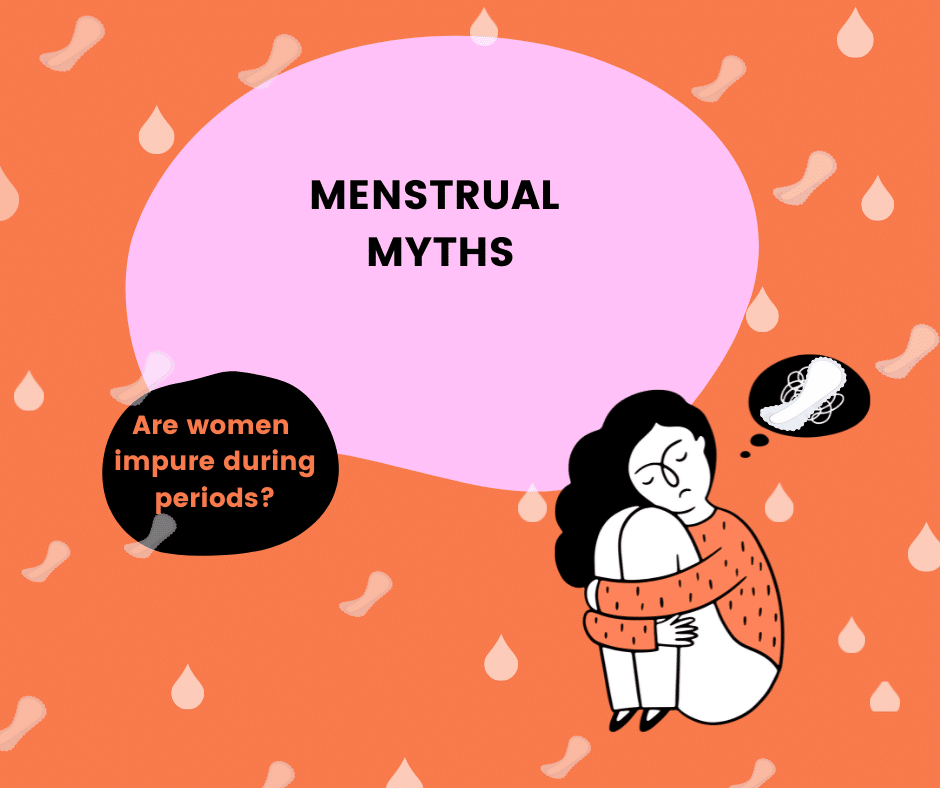
Going into the kitchen and cooking food is a big no during periods; why? We always get infamous advice related to the period, sex, and puberty. Have you ever come across strict instructions for eating, sleeping, and walking during periods? Have you ever questioned them?
Menstruation has always been enclosed by taboos and myths restricting women from many aspects of socio-cultural life. In India and other international countries, the topic has been taboo. Such taboos impact women’s emotional state, mental health, lifestyle, and hygiene. The challenge of addressing socio-cultural taboos and beliefs, especially in rural areas, is further complicated by the lack of knowledge and understanding of puberty, menstruation, and reproductive health. Below are some myths and taboos that hold women and need immediate attention.
During menstruation, girls are impure.
Be it rural or urban areas, and women are restricted from cooking or entering the kitchen. Not only that, they are advised to not visit any sacred place or perform any puja or ritual.
A period is like a natural monthly phenomenon, and nothing is impure. This belief is devoid of any scientific explanation. I have some friends who accept this and avoid going to the kitchen and sacred places during places. But why? I am more of men staying behind and doing the chores, so females can relax during the period. The explanation and awareness behind this taboo need to be changed.
Menstruation is a personal issue and shameful.
While even writing this, I am shocked to the core. Seriously we live in a society where menstruation is a shameful act.
We need to end period shaming and misinformation. However, somewhere in our lives, we have experienced shame and embarrassment. Sometimes it is the silent pressure of restricting yourself, whether you feel you have to sneak or hide tampons while you visit the loo, or you have mastered the art of hiding waste wrappers, quickly disposing of them so your dad or brother cannot see them. Other times, period shaming is prominent, with people being excluded from work, school, or community activities. Lack of education or social stigma around periods hold us all back.
Large numbers of women in rural areas of India drop out of school when they begin menstruating. In addition to this, menstruation creates obstacles for female teachers. The gender unfriendly school culture and patriarchy target female hygiene and undermine their privacy rights. Poor facilities and inadequate washing facilities increase susceptibility to infection, with the odour of menstrual blood putting girls at risk of being stigmatized. This latter can impact their mental health. Their first period can be exciting and dignified for those equipped with information, hygiene products, and a supportive community but for others, and their first period can be a nightmare. The shocking part is, that some girls even think they are dying when they see their own menstrual blood for the first time. We need to end this. We can’t let socio-cultural beliefs impact women’s mental health and deteriorate their bodies. Malnutrition and period hygiene are interconnected.
If we cannot give women a healthy environment, their human rights are violated. This needs the whole women community to come forward and address these issues in their schools, home, and offices. Educate your daughter, your female helping staff at home, and unprivileged girls. Start this right now. Let’s do this, girl, stop feeling the shame, stop wrapping the sanitary products in paper, and include boys as well in this discussion. We are not ashamed. Menstruation is just a normal phenomenon; remember that.



